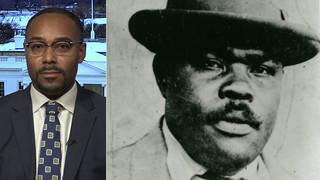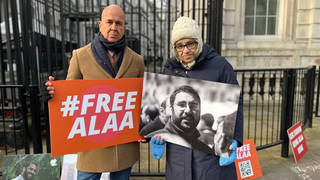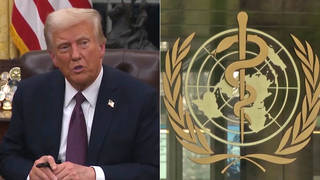
Related
Topics
Guests
- Lauren Aratanireporter for the Guardian US covering the Trump Organization civil fraud trial.
Former President Donald Trump lashed out from the witness stand at the judge and prosecutor in his New York civil fraud case Monday. He could be forced to dissolve much of his real estate empire and bar his family from doing business in New York. “The scene was pretty incredible to witness,” says Lauren Aratani, reporter for the Guardian US who is covering the trial. The court is now determining how much the Trumps must pay in damages as the case enters the penalty phase.
Transcript
AMY GOODMAN: This is Democracy Now!, democracynow.org, The War and Peace Report. I’m Amy Goodman, with Juan González.
Donald Trump took the witness stand Monday in a civil fraud case brought by the state of New York against the former president, his sons and his businesses. Trump was repeatedly admonished by Judge Arthur Engoron for testimony that veered off topic, lashed out against the court and New York Attorney General Letitia James, whom Trump called a “political hack.” James is seeking $250 million after accusing Trump, his oldest two sons, the Trump Organization and company executives of inflating the value of assets. The judge has already ruled Trump liable for fraud. The trial determines how much the Trumps will pay in damages.
For more, we’re joined by Lauren Aratani, reporter for the Guardian US who has been attending the trial, her most recent piece headlined “Speeches and grandstanding: Trump scores few if any legal points in court.”
So, you were there, Lauren. If you can describe the scene, but also contrast his hurling epithets, getting angry, his face getting red, with the documentary evidence that’s been presented in this trial?
LAUREN ARATANI: Yeah, the scene was pretty incredible to witness. I mean, not only is there the typical media circus that surrounds Donald Trump, but then you also have it in a very, you know, what’s supposed to be a civilized courtroom. It’s very quiet. There are no cameras or recordings allowed. So, really, it’s just a prosecutor asking Donald Trump, the witness on the stand, these questions.
So, what we saw a lot yesterday was Trump would often kind of get into these rants, as I mentioned in my piece, and really kind of was reminiscent of what he was like at his rallies, where he would really go off, a bit off topic, on election interference or crime in New York City, kind of, you know, saying that New York Attorney General Letitia James, who’s been attending the trial every day — you know, kind of making the case that she’s wasting her time, saying that the case is unfair.
And, of course, what the prosecutors have been doing with Trump and his adult sons last week is showing these documents where essentially the Trump family signed bank agreements, you know, term agreements with these banks who gave them loans, saying that their financial statements were fair and accurate. So, you have a lot of these documents, emails, these things that are being pulled up in front of Trump, and, you know, he’s basically saying that he kind of relied a lot on this idea of a “worthless clause,” which is basically that the banks knew not to take, I guess, the Trump Organization for its words when it came to these financial statements. And, of course, the judge, in his pretrial judgment, had written that the worthless clause argument is, in itself, worthless. So, we saw a lot of that yesterday, a lot of Trump basically, you know, doing what he does, except the only person that really matters in this courtroom is the judge, and he even seemed to kind of express a lot of frustration toward him.
JUAN GONZÁLEZ: And, Lauren, at the beginning of the trial, Michael Cohen, Trump’s former lawyer, testified that Trump had directed him to manipulate financial statements. How does Cohen’s testimony fit into the broader context of the trial? And was Trump questioned about that testimony?
LAUREN ARATANI: Yeah, so, Trump wasn’t questioned directly on Michael Cohen’s testimony. But what Trump was asked — so, basically, Michael Cohen testified that he, along with two of Trump’s top finance executives — there is Allen Weisselberg, who used to be chief financial officer of the Trump Organization, and Jeff McConney, who was the Trump Organization controller. Basically, he would say that, you know, Trump would direct the three of them to essentially increase his net worth on the financial statements. Cohen, you know, basically wasn’t necessarily that specific on the assets that he was asked to increase on the financial statement, but there was briefly a document that was pulled up that he had confirmed that Trump, in handwritten notes, had basically instructed them to increase their assets. But Trump wasn’t questioned directly on Cohen’s testimony, that was a few weeks ago.
AMY GOODMAN: We just have 30 seconds, but what do you think is the big takeaway? Trump testified now. He’s expected to testify again when the defense presents their case. His daughter Ivanka is going to be testifying. Talk about the significance, overall, and if you were surprised by anything, Lauren.
LAUREN ARATANI: Right. Like, I think, you know, what we’ve been seeing a lot lately is — I wrote a piece a few weeks ago that was basically talking about how what we’ve been seeing is this a trial within a trial. We have the trial that’s in the courtroom. You know, there’s no jury. It’s just the judge basically deciding whether Donald Trump will be paying a $250 million fine.
But then there’s also the trial that he sees as more important, which is in the court of public opinion. And we definitely saw that yesterday. We’re seeing that last week with Trump’s sons, when they were saying that they don’t recall, that they, you know, in angry times they also were very much kind of going on —
AMY GOODMAN: We have 10 seconds.
LAUREN ARATANI: — their own little angry kind of rants. And so, yeah, a lot of what we’re seeing is just politics in the courtroom.
AMY GOODMAN: Well, we’re going to do Part 2 and post it online at democracynow.org, Lauren Aratani, reporter for the Guardian US.
Happy belated birthday to John Hamilton and Emily Andersen! I’m Amy Goodman, with Juan González.











Media Options